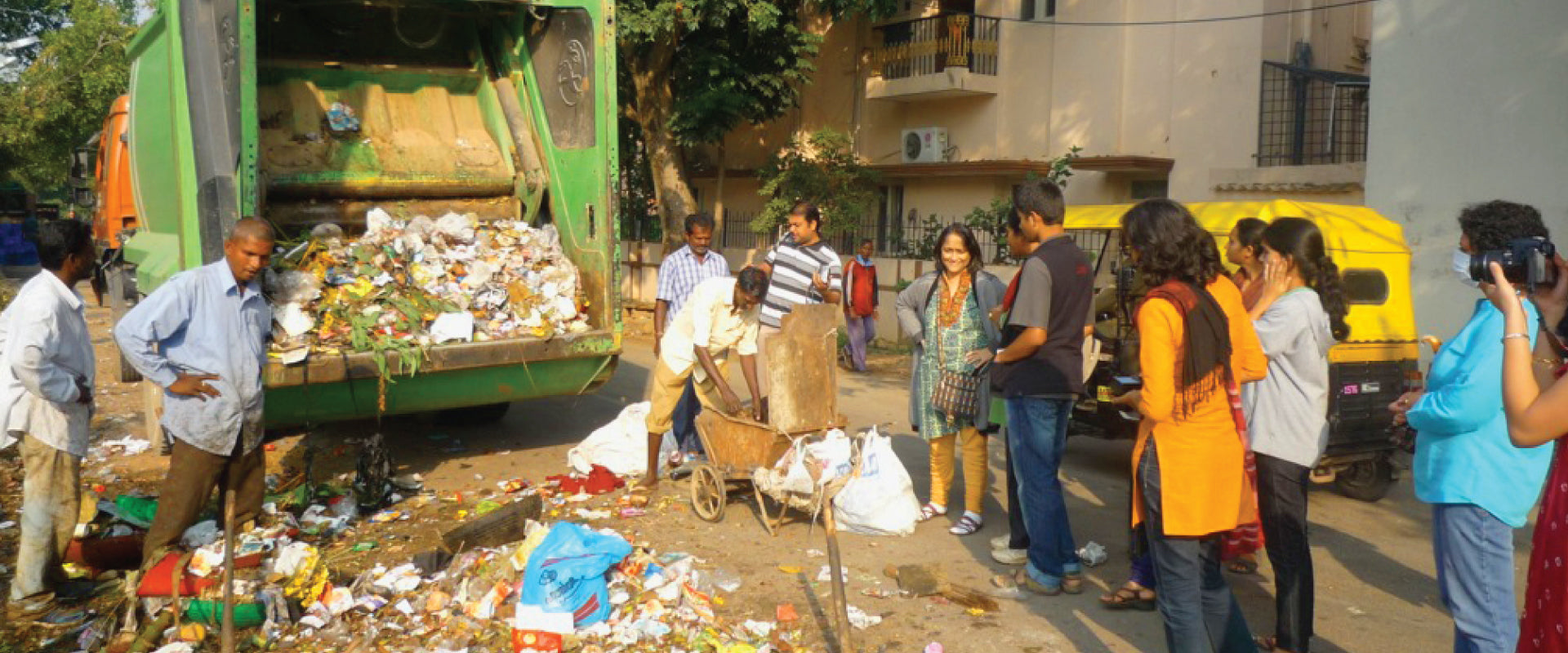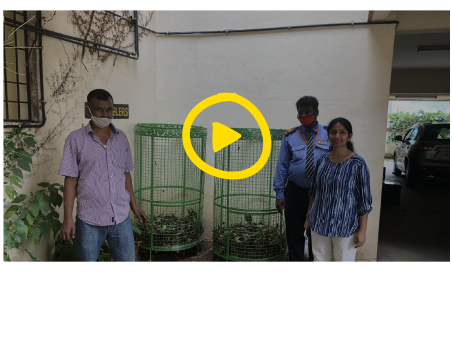Can Individual action mitigate Climate Change?

Are Individual Green Changes just a way to feel less guilty?
The other day someone forwarded me an Instagram post. It was very emphatic, and the message was clearly articulated. The post stated that it was futile to promote individual action on climate mitigation because what was really needed was systemic policy change, so therefore all efforts should be spent on changing policies, creating legislation. I found the message led me to reflect on the decisions I had taken on Daily Dump the past 15 years. After all, we as a Brand promote individual action and assure our citizen customer that their action is important to mitigate climate change.
As individuals, we often ask ourselves – Where should I put my efforts for a better impact on environment? Should I put my weight behind creating policy change and not really bother about individual actions? What is the answer that is rooted in reality?
What do you think?

There are many different perspectives out there on this big question.
There is some research to show that making green shifts in your individual lives make you less likely to support more important and possibly more burdensome decisions to mitigate climate change. Reading this article made me aware of how this study is based in the global north and may not fully apply to our current needs and context in India. But do read the discussion that follows the article. What I found interesting is it implies that the bigger actions that are needed for climate change are not so culturally prominent as they need to be, which is something I would agree with. For example, Instagram has more examples of bamboo toothbrushes as symbols of climate change than reducing energy or reducing cars.
The 2017 article in the Guardian shook the foundations of the “individual action is important” approach by bringing corporate greed and power to the forefront as the cause and driver for the climate crises. In this very compelling article Martin Lukacs says “While we busy ourselves greening our personal lives, fossil fuel corporations are rendering these efforts irrelevant. The breakdown of carbon emissions since 1988? A hundred companies alone are responsible for an astonishing 71%. You tinker with those pens or that panel; they go on torching the planet.”
He leaves you feeling astonished that we have let this happen to us, dejected because we sense that this battle is perhaps beyond the scope of our individual action, and fatigued, do we really have the resources to fight against what seems to be powers that are invincible?

Martin’s article does two important things:
- It brings the scale of the problem out on the table, and it is staggering to know how big the emissions are and see how only a few are responsible for the chunk of the mess.
- It explains the notion of neoliberalism as a “spell” of a culturally normalized idea of individualism combined with unbridled corporate power that has undermined the processes and structures of collective action, of “people power”.
A quick glance at urban India today underwrites these points – there are bigger cars on roads that cannot carry them, making it even less urgent for the decision-making elite to build efficient and convenient public transport – and the social norm celebrates individual vehicle ownership. So international auto makers get subsides, tax cuts and free land to make more cars instead of us investing the required funds to make public transport the most convenient and accessible way to mobility.
So, while you may jump in and buy less, eat a plant-based diet, walk to work, choose to reduce the energy in your home, once you have read Martin’s article you will experience an unease about your individual action and its merits.

And yet - a little voice at the back of your head tries to edge into this sea of despair – but composting is going to have a positive impact, I keep my waste out of landfill, should that not count? Should not the green choices of millions of individuals count in the climate change mitigation effort?
Yes, in my mind, individual actions matter when there are many many individuals pushing for some change. I think individual action and systems change are equally important. You need both.
Let’s take the example of composting - before 2006, home composting was not an idea that was even culturally or socially possible. It needed many brave individuals to begin this radically new activity in their homes and this led to a gradual acceptance of this practice which resulted in a critical mass supporting the idea of decentralized systems. This then encouraged the government to accept decentralized approaches in policy without feeling challenged. So, is this system change or not? In my mind it is, individual actions drive a change in the system (which takes time). Changing behavior and policy change feed off each other. This is my experience.
You may choose to spend time working on one part of a system, you may work on the policy first and go back and forth on the structure that needs to be changed or design an intervention that helps make the change easier. This does not mean that there is only one way to address systems change. The biggest lesson I have learnt is that you need to stay on the ground for systems change to happen, it takes time and often money and patience run out.
It’s also good to locate yourself in this interconnected world – I use these three questions to keep a tab on the big picture and the little details.
1. Who am I?
Not everyone is suited for policy work and not everyone enjoys creating behavior change opportunities. I took some time to understand where I would be most effective, made a lot of mistakes and kept trying to see if individual action can be leveraged to its best potential. As I continue to do this, I have enormous respect for folks who work on policy and think tanks and even political activists.
2. Have I understood the inter-relationships and connections of the system?
For example – the food system is a large emitter of greenhouse gases, while the agricultural emissions are higher than the waste ones, I still chose to work in the waste side. I felt that underlying the food waste volumes was a perception that it was a yucky not cool job to manage. I chose to intervene here to raise the overall awareness of the generators of food waste of their own agency to make a difference. I pushed to design a solution that allowed participation.
I love examples of big projects that have succeeded - India moved from tungsten to LED bulbs in a wonderfully orchestrated central plan that saved us huge amounts of energy and money as a nation. “As per the National UJALA data, UJALA scheme has resulted in annual cost savings of ~Rs. 19,000 crore (US$ 2.59 billion) over six years, translating to energy savings of ~47 billion kWh (kilowatt-hour) in 2021.”
Interventions like this remind me that scale is necessary in our context as is a need for the positive impact to be not reserved only for the elite. I try and see how to achieve scale and equity in the work I do – using the resources I have.
3. Am I working to help create new social norms?
In this article Lacy Cagle writes eloquently of the value of social norming effect. And in my work, I have found that we need behavior change often to reach critical scale and this needs to happen from the ground up, it begins with individuals acting for a new purpose.
While some folks will begin from creating change at the individual level and others at the policy level, we must acknowledge our biggest challenge. Our weakest link is the funds that are needed for systemic change – this and the ability to try new models. Example – If a city does convert its wet waste to compost – how do we ensure this priced fairly and reaches those who need it most – farmers and urban landscapes. The supply chain and storage and transportation are barriers to implementation and often such projects for the common good, need a blend of philanthropy and private capital. This is very hard to put in place, because the work takes many years of just making new connections from old relationships and there is nothing visible to show as outcomes for a long time. So, if I had a wish-fulling tree, I would ask for this to change.

In the food waste area, there are many more such areas that need attention and I know that there will be innovators and community organizations who will work on these over the coming years in our country.
I know that they will not ask the question – Is individual action enough, they know that we need both – individual and systems change.
Here’s wishing them all the best – and positive impact.
And if you want to start composting, we're here to help !
Start with leaves this month of February and save this wonderful resource.
Poonam Bir Kasturi
Feb 2022





